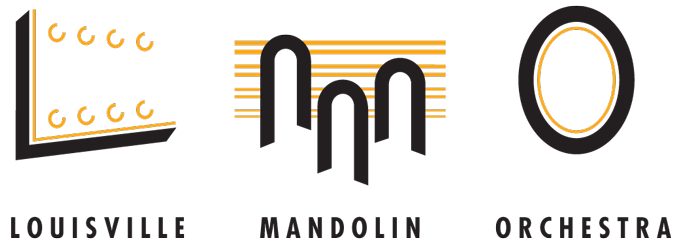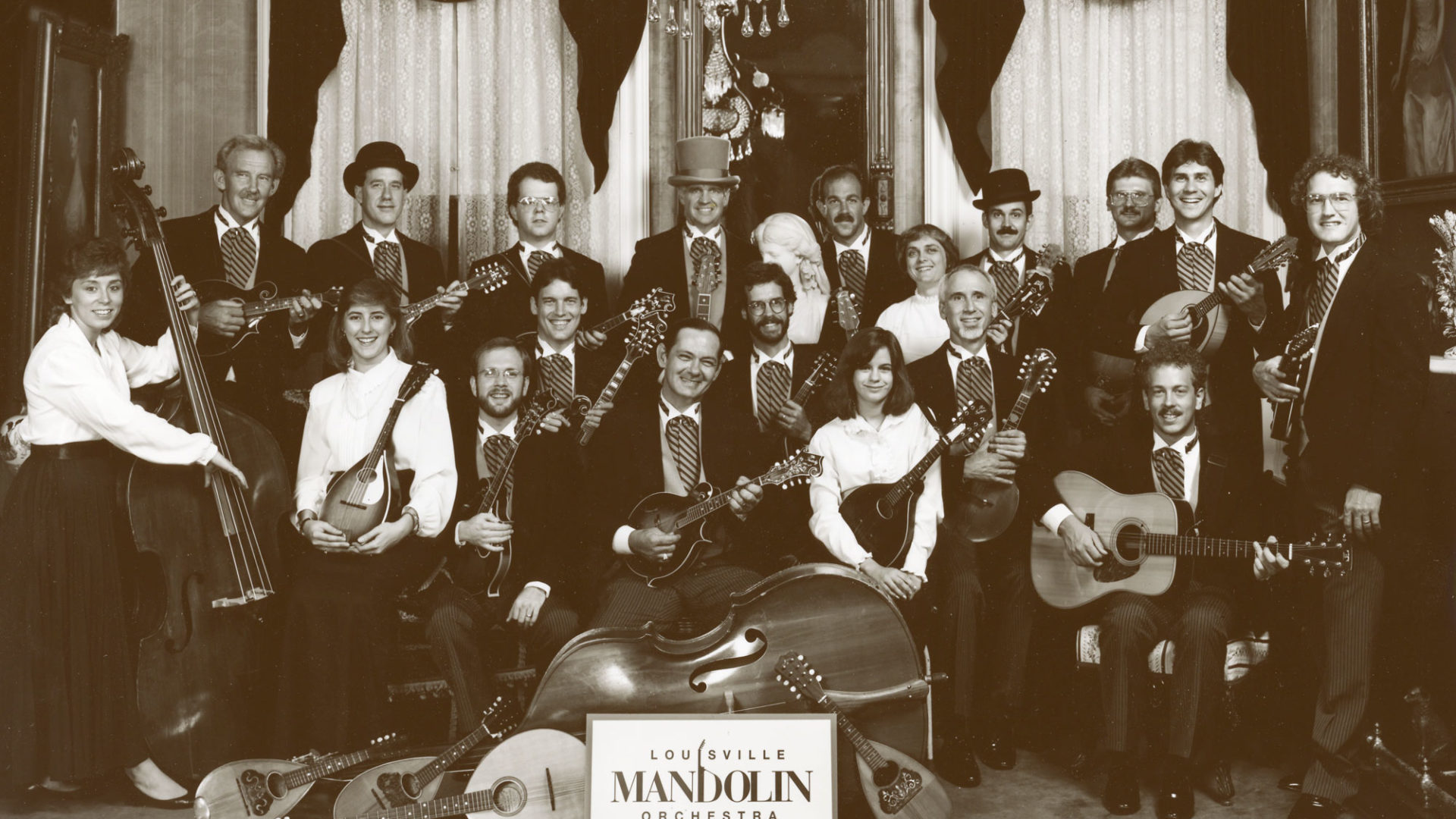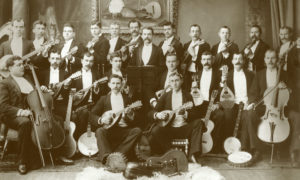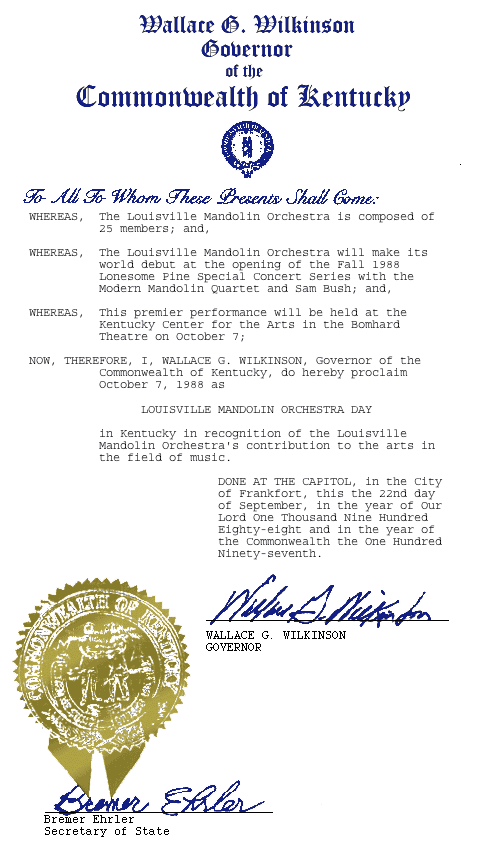Even though we are a relatively young mandolin orchestra, numerous mandolin orchestras have come and gone in the Louisville, Kentucky area since before the turn of the century. In this section Robin Harris recounts the first few years of our formation since our founding in 1988.
1988
SCHROEDER’S IDEA:
Reviving a Tradition.
In the summer of 1988 Louisville mandolinist Michael Schroeder brought together a group of musicians who would come to be known as the Louisville Mandolin Orchestra. Schroeder wanted to revive the tradition of the “mandolin clubs” which had thrived in the early years of this century in Louisville and elsewhere.
Louisville’s newspaper,The Courier-Journal, featured Schroeder and his novel idea of resurrecting the “mandolin club” in a front-page “Arts” section story early in the summer of 1988. The idea appealed to an eclectic group of mandolinists and guitarists who read the Courier-Journal story and answered the call for musicians.
FROM IDEA TO REALITY:
Rehearsals begin and new friends are made.
The first three months of LMO’s existence proved exciting. Weekly rehearsals took place on Saturday mornings at the University of Louisville, with each week bringing new faces and instruments to the mix.
One of those new faces was Jim Bates, a bass player and public school music teacher who took on the job of LMO conductor. Bates’ high energy and good-humored enthusiasm meshed perfectly with the eclectic mix of personalities who made up LMO. His ability to encourage players to improve without being overly critical inspired the group. Forced to deal with many musicians who had not played in an ensemble setting and with others whose ensemble playing had been in bluegrass and/or rock groups, Bates provided the spark that united the group musically.
Mike Schroeder continued to recruit new players and introduce new music to the group, challenging the members (many of whom did not read music well) to move their playing to a higher level.
By summer’s end, the group had tackled a wide range of music, including “Recuerdos de l’ Alhambra” by Francesco de Tarrega, “The Avignon Suite” by Fried Walter, and “Ein gut Danzeren: Funf Tanze um 1600” (Five European Dances) by Elke Tober-Vogt.
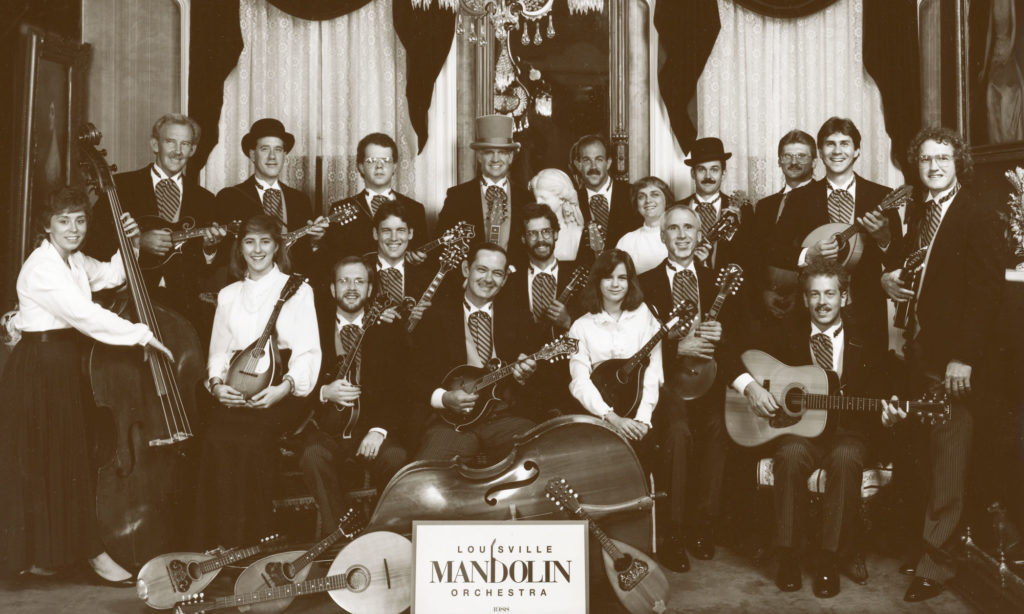
OPPORTUNITY KNOCKS:
The Lonesome Pine Special comes calling.
In September of 1988 LMO received an invitation from Richard Van Kleeck, Director of the Lonesome Pine Special Concert Series at the Kentucky Center for the Arts, to perform in the opening concert of the Lonesome Pine fall series. The show, “Mando Magnificat,” would feature mandolin stars Sam Bush (of Newgrass Revival fame), Mike Marshall and The Modern Mandolin Quartet.
The LMO prepared feverishly for its debut, polishing the suite of five European dances by Tober-Vogt and Walter’s “Avignon Suite,” and working through two pieces to be performed with Sam Bush and The Modern Mandolin Quartet. These two pieces, Aaron Copland’s “Hoedown” and George Frideric Handel’s “Water Music,” provided the most difficult challenge yet for the fledgling group.
At 8:00 p.m. on October 7, 1988 in the Bomhard Theater of the Kentucky Center for the Arts, Richard Van Kleeck took the stage to welcome the audience and to announce that Governor Wallace Wilkinson had proclaimed this day Louisville Mandolin Orchestra Day in Kentucky. The LMO then opened the show. The hours of intense preparation paid off as the 24-member ensemble, under the direction of conductor Jim Bates, took the stage and played to an enthusiastic sold-out crowd.
Mando Magnificat proved a rousing success. Near the end of the show when Van Kleeck again took the stage to direct The Modern Mandolin Quartet, Sam Bush and LMO in the “Water Music” and “Hoedown,” the audience knew they were in for a treat. And those on the stage knew that they were creating a sound not heard in Louisville since the early part of this century, the sound of a true mandolin ensemble.
Mando Magnificat ended with “Hoedown,” featuring a terrific set of solo performances by Bush and Marshall. The audience roared its approval and rewarded the musicians with a lengthy standing ovation.
The following day a glowing review of the evening’s performance appeared in The Courier Journal which included a summary of the previous months effort within a paragraph.
MOVING AHEAD:
Building repertoire and technique.
After the tremendous response to their debut, LMO set about to expand its repertoire and to improve the technique of its players. Under the guidance of Conductor Jim Bates the group began learning Antonio Vivaldi’s “Concerto in G Major for Two Mandolins” and Siegfried Behrend’s “Suite nach japanischen Kinderliedern” (Japanese Children’s Songs Suite).
Meanwhile LMO discovered a composer in its midst. John Goodin, a mandolin / octave-mandolin / guitar player, introduced the group to a tune he had written about a famous road in Louisville. “Up River Road,” a complex and musically challenging melody, soon became a trademark tune of LMO. Eventually this tune became the opening piece of “The Louisville Suite.” The second and third movements, “Cave Hill” and “Locust Grove,” evoke the spirit of a well-known Louisville cemetery (Cave Hill) and the home of American frontiersman George Rogers Clark (Locust Grove). In the years that followed, LMO would express itself time and time again through the music of John Goodin and internationally known European mandolin orchestras would perform (and even record) his compositions.
All in all, 1988 proved be be an eventful first year for the Louisville Mandolin Orchestra and set the course for many productive years to follow.
1989
INTERNATIONAL LINKS:
Technique Arrives from Across the Pond
In March of 1989 LMO invited world famous classical mandolinist Keith Harris to Louisville to conduct a week-long workshop. Held at the University of Louisville, this intensive, technique-driven series of classes heightened LMO’s attention to detail and helped the players move to a higher musical level. Keith Harris introduced the orchestra to classical pick techniques, techniques which were critical in the development of LMO’s classical sound.
Working with Harris (called the “Paganini of the Mandolin”) affected the quality of the group dramatically. The workshop activities culminated in a concert held on Saturday, March 18 at the University of Louisville’s Middleton Auditorium. The first half of the concert featured solo mandolin pieces performed by the versatile Mr. Harris. LMO performed Vivaldi’s “Concerto in G Major for Two Mandolins,” with Michael Schroeder and Philip Wakeman performing the first and second parts respectively. John Goodin’s “Up River Road” received a warm response from the audience and the show ended with LMO performing a transcription of a Torelli violin concerto with Harris as soloist.
The success of the concert and the enthusiasm of LMO members impressed Harris and resulted in LMO receiving an invitation to the German Bundesmusikfest, an international mandolin festival held every four years. Although LMO was unable to attend the 1990 event, Harris’ visit to Louisville opened the door for LMO to travel to Germany for the 1994 event held in the former East German town of Schoeneck.
MANDO MAGNIFICAT 2:
Look Ma, I’m on TV!
The Louisville Mandolin Orchestra’s initial foray into public performance in the fall of 1988 proved so popular that Lonesome Pine Director Richard Van Kleeck invited the group back for a second show during the 1989 LPS summer series. “Mando Magnificat II” would open the series and would feature not only Sam Bush and The Modern Mandolin Quartet but also Peter Ostroushko, the musical director and a regular performer on Garrison Keillor’s radio show, “A Prairie Home Companion.” Adding to the excitement surrounding this event came the news that the show would be videotaped for broadcast on PBS stations across America as part of the Lonesome Pine Specials syndicated series. (The LPS syndicated series has appeared on public television stations across the United States as well as on stations in seven European cities.)
On August 1 in the Bomhard Theater, LMO once again took the stage, the group a bit larger than the previous year and the music considerably more demanding. The 27-member group overcame the nervousness that comes from playing in front of television cameras (and a live audience) to give an excellent performance. Stellar performances by Sam Bush and Peter Ostroushko, a stunning duet by Bush and Mike Marshall and gorgeous ensemble playing by The Modern Mandolin Quartet combined to create a truly magical mandolin evening. The show’s finale brought all the musicians onstage to perform Manuel de Falla’s “La Vida Breve” and Aaron Copland’s “Hoedown.” Richard Van Kleeck conducted the finale and the audience responded as it had the year before with a loud and lengthy standing ovation. Perhaps the best evidence of this show’s quality can be found at the Smithsonian: the videotape of Mando Magnificat II is one of only five Lonesome Pine Specials that have become part of the Smithsonian’s collection.
RADIO DAYS:
Partnerships with Public Radio Pays Off
From the beginning, LMO received enthusiastic support from WFPL and WFPK, two of Louisville’s three public radio stations. WFPL (the “jazz and information” station) had recorded Mando Magnificat in 1988 and had run it as part of the syndicated “Lonesome Pine Specials” series. (This popular series ran for years on National Public Radio [NPR] and American Public Radio [APR] affiliates across America.) On August 20, 1989, WFPK (the classical music station) broadcast a live LMO concert from the Unitarian Church in downtown Louisville. “Playful Pizzicato” from Benjamin Britten’s “Simple Symphony” and “Up River Road” from John Goodin’s “Louisville Suite” hit Louisville’s radio airwaves and LMO reached out to yet another segment of the Louisville community. WFPK also recorded the concert and has played excerpts from it over the past few years.
In an ongoing effort to lend support to the stations which so generously supported LMO, orchestra members have joined in the fundraising activities of Louisville’s public radio stations (now known as the Public Radio Partnership). Each fall and spring, LMO members volunteer to answer phones during the membership campaigns.
COMMUNITY LINKS:
Reaching Out Through Charitable Events
In October, 1989 LMO performed again at the Kentucky Center for the Arts, this time to benefit the Kentucky Opera Association at its annual book sale. LMO played to a large and noisy crowd, helping to make the KOA sale a success. This was the first of many charitable events in which LMO has participated over the last seven years in its continuing effort to reach out to Louisville’s diverse community.
1990
HITTING THE ROAD:
Traveling the Highway to Stardom.
Early in 1990 the Kentucky Department of Tourism asked LMO to help promote the state at a regional tourism convention to be held in Atlanta, Georgia. LMO prepared several new pieces, including Jim Bates’ arrangement of Stephen Foster tunes and a series of Renaissance dances by Michael Praetorius.
The entire group headed for Atlanta the first weekend in March and played to an enthusiastic but noisy group of conventioneers at the “Kentucky Luncheon” on March 5. The crowd received the group warmly and even joined in on some of the familiar Stephen Foster tunes. This performance helped lend credibility to LMO and heightened the group’s self-confidence. It was the first of many “road trips.”
1990 ENDS IN A FLURRY:
More Playing, More Confidence.
Fall, 1990 provided several performance opportunities for LMO. One of the newer members, Dr. Richard Barber (Dean Emeritus of the College of Arts and Sciences at the University of Louisville) arranged for the group to play for the University’s “Lunch and Learn” program at UofL’s Shelby Campus in eastern Jefferson County. The September 14th show enabled LMO once again to expand its outreach. This audience, made up of retired faculty, staff and alumni of the University, responded warmly to the eclectic program of classical and popular music.
In October the Kentucky Opera Association invited LMO to return to the Kentucky Center for the Arts for the KOA Book Sale on October 10. The KOA event gave LMO a chance to try out some new music it was preparing for two upcoming concerts: an October 28th performance at Louisville’s Cathedral of the Assumption and the closing concert of the Classical Mandolin Society Convention which LMO was to host in early November.
The Classical Mandolin Society of America Convention brought several hundred mandolin players and enthusiasts to downtown Louisville’s Holiday Inn for workshops, concerts and jam sessions. The final concert on Saturday evening at the historic Macauley Theater featured artists who had performed previously with LMO (Sam Bush, The Modern Mandolin Quartet, and Peter Ostroushko) as well as some who had not (Neil Gladd, the Mair-Davis Duo). The marathon concert lasted well over four hours and proved a fitting finale to LMO’s foray into convention-hosting.
An exhausting but exhilarating year of activity had broadened LMO’s influence in America’s classical mandolin community.
